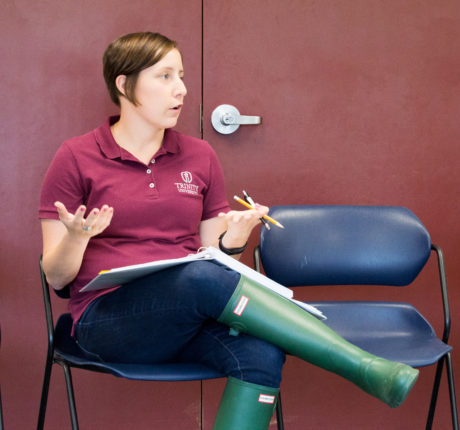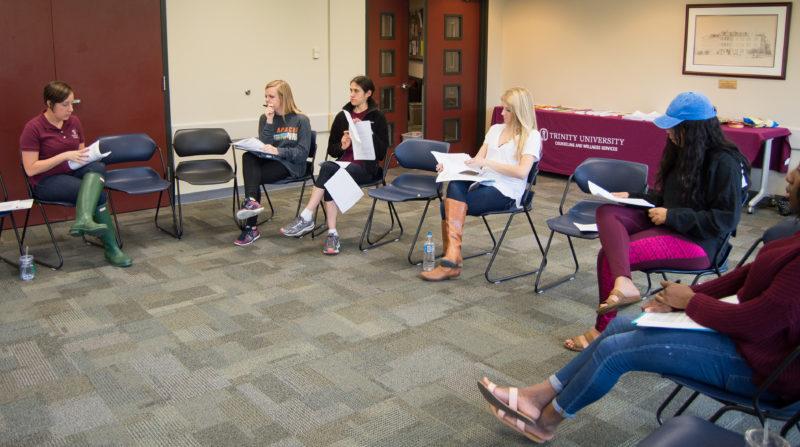This year, members of Trinity sororities will partake in the Body Project, a group initiative that promotes healthy body image on campus. Last year, there were roughly 50 workshop attendants and 15 peer leaders; Wellness Services expects similar numbers this year.
“The Body Project is a body image intervention that has more research support behind it than any other body image intervention in the world “” when I say volume of research support, I mean it’s not just one group that’s found that the Body Project actually improves body image and associated factors, but many research groups around the world have found that it improves [body image],” said Carolyn Becker, professor of psychology. “Originally developed by Dr. Eric Stice, who is currently at Oregon Research Institute, the project was created because he wanted to prevent eating disorders, so it was originally created as an eating disorders prevention program, and it does in fact prevent the onset of some eating disorders.”
As many campuses no longer use it as a tool targeting eating disorders, Trinity deploys it to address body image issues that tend to be prevalent among target populations.
“The idea behind the Body Project was that, if you can disrupt this sort of first-risk factor of thin ideal internalization, then you could break up the cascade to issues like eating disorders,” Becker said. “The Body Project leverages cognitive dissonance, and it assumes that you, to some degree, have internalized the appearance standards of our culture and that you on some level have bought into what our society says is the ideal woman in terms of appearance. If we can have you speak and act against those appearance standards, then your actions will now be different than your beliefs, and then your beliefs will come in line with your actions.”

First introduced to Trinity in 2001, the Body Project has made Trinity students an essential part of the psychological research that has taken place as part of the program. Such data is usually collected during a pair of two-hour-long sessions that occur during the spring.
However, as of 2016, Wellness Services is running the Body Project at Trinity in an attempt to make the initiative accessible to more students.
“When the Body Project transferred from the psychology department to the wellness office, we tried to make it more open,” said Katherine Hewitt, coordinator of Wellness Services. “We break it into two main groups: Our peer leader group is typically out upper-class students “” sophomore and above “” and our participant group is mostly first-years, with a couple of exceptions to those main groups. For peer leaders, most are done through the Greek system, but we don’t exclude anyone for not being Greek”.
However, while the project is open to all students, most recruits are involved in Greek life.
“I think it started out of the support from sororities on campus, and the sororities identified a need, and we were able to partner with Dr. Becker in psychology and talk about this vehicle for conversation and changes in a community that had 25 percent of women on campus involved,” said Jeremy Allen, assistant director for fraternity and sorority life. “Greek life was the initial audience because it was a convenient way to involve students both from a leadership perspective and a participant perspective. It was a pipeline that you knew you’d have. Every year, there’s 200 new sorority girls, and the project was infused as a part of orientation.”
Sorority members have traditionally been the main focus on this project. However, two years ago, fraternity members were also included.
“The fraternities were really excited and on board to be a part of the Body Project. … I think it gave an interesting dynamic to the project to say that these aren’t just issues for women but are also issues for men,” Allen said. “I think it was a really cool pilot program, and in the future it might be interesting to try and look at how we might involve men, whether it be men-only groups, or mixed-gender groups. It’s valuable to have men involved, but I just think that has to be directed and strategic.”
Fraternity involvement only lasted a year, but it was still a part of the psychology research that Becker had been conducting, which was aimed at looking at the viability and effectiveness of expanding the program. Data received from members who participated indicated the mixed-gender groups did not yield the same results as the female-only groups.
“Because it’s an evidence-based program, lots of research has gone into implementing the program and figuring out who has better pre- and post-improvements in terms of body satisfaction and confidence,” Hewitt said. “It turns out that females have a higher need in this area than their male counterparts do, as there has been mixed-gender groups as well, but female-only groups are our best bet and will share more information.”
The Body Project will be on campus this spring, as an all-female group. Hewitt has also established a wellness practicum class, which consists of six students who will end up running the practicum.
This group met for a public training session on Friday, Sept. 29. Students involved look forward to the opportunity to lead the program.
“Training was good, the only people that were there were people in the wellness practicum class, but it was nice to have a team who all had the same common goals of being at this event,” wrote Oumoul Setamou, junior anthropology major, in an email interview. “I’ve always been really interested and socially conscious of my own body and gender and race, and I think this project is so so important in terms of bringing awareness to so many different facets of body issues and gender dynamics that college women face. It’s a welcoming space to come and chat or just listen about commonalities and differences we have as college women and I’m happy to be a part of it. Our coordinator, Katherine, has worked so hard to put this together, and I hope more women decide to participate in this program.”
Training sessions will continue in the fall, and members encourage women across campus to get involved. For more any questions about the Body Project, please email Hewitt at khewitt@trinity.edu.







